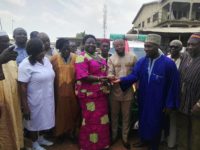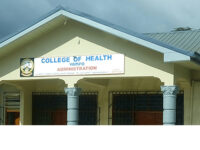
Ghana News–The Ministry of Health would from Monday, April 23 to Sunday, April 29, jointly commemorate the Africa Vaccination Week and Child Health Promotion Week in all health facilities and outreach posts across the country.
There would be immunization services, Vitamin A Supplementation, provision of Child Health Record Cards, Growth Promotion and birth registration, an official statement signed by Mr Robert Codjoe, the Head of Public Relations, Unit said.
“Remember, Vaccination is a gift for life and a shared responsibility, lets come together to ensure a healthy future for our children,” the Ministry urged.
This year marks the eighth year of the commemoration of the Africa Vaccination Week, which the Ministry and the Ghana Health Service would join the rest of Africa to celebrate under the theme: “Vaccines Work, do your part”.
“This theme reflects the need for everyone: government, health workers, parents, families and community leaders to support immunisation activities in their communities to ensure that children are not denied this life-saving intervention,” the Ministry said.
“Everybody has a role to play in fighting vaccine-preventable diseases such as poliomyelitis, whooping cough, measles, yellow fever, tetanus, diphtheria, influenza, diarrhoea, pneumonia and Hepatitis B. Vaccination prevents infections and protects us all – infants, children, adolescents and adults.”
The commemoration of African Vaccination Week was instituted in 2010 in response to a resolution adopted by Ministers of Health at the sixtieth session of the WHO Regional Committee for Africa. The aim is to ensure a galvanized African Regional action to reach every child with targeted evidence-based high impact health interventions.
The Week seeks to strengthen immunisation programmes in the Region by increasing awareness of the importance, the need and the right of all persons to be protected against vaccine-preventable diseases.
In Ghana, African Vaccination Week is commemorated alongside the annual Child Health Promotion Week to strengthen Ghana’s Immunisation Programme by raising awareness on the value and importance of immunization, community ownership and the need to increase vaccination coverage.
The commemoration offers an opportunity to advocate for support to ensure the uptake of new and existing vaccines while at the same time prioritising service provision to hard-to-reach areas.
The Child Health Promotion Week also offers a platform to create awareness on other life-saving interventions such as vitamin A supplementation, the use of insecticide-treated nets for protection against malaria and growth monitoring.
“Immunisation has been demonstrated to be one of the most effective public health interventions available.
“It is considered to be the cornerstone of public health care. Immunisation currently saves three million lives per year worldwide, and remains one of the most cost-effective health interventions.”
The Ministry said Ghana had made modest strides since the introduction of the Expanded Programme on Immunization in 1978.
Between 1978 and 1992, Bacille Calmette Guerin(BCG), Measles, Oral Polio Vaccine (OPV) and diphtheria/Pertusis /Tetanus (DPT) were vaccines used in the routine immunization services. Also, Yellow Fever and hepatitis B, haemophilus influenza type b vaccines were introduced in 1992 and 2002 respectively.
Additionally, in 2012, Ghana introduced the pneumococcal vaccine (against acute respiratory infections particularly pneumonia) and the rotavirus vaccine, which also protects against diarrhoea.
Vaccines against rubella and Meningitis have also been added. In June this year inactivated polio vaccine will be added to the routine vaccines for children at 14 weeks.
“It is worthy to note that since 2002, Ghana has not recorded any deaths due to measles and no case of wild poliovirus has been reported since the last outbreak in 2008,” the Ministry said. “Ghana has also successfully eliminated neonatal tetanus since 2011.
“This is mainly due to successful National Immunization Days (NIDs) and improved routine and surveillance activities. Indeed, most Ghanaians below the age of thirty would not remember childhood diseases like measles, whooping cough, diphtheria and polio that used to kill or permanently maim hundreds of children annually in Ghana.
“However, painful memories of outbreaks of measles and other vaccine-preventable diseases and their associated hospitalization and deformities as well as deaths still remain fresh in the minds of the older generation. It is important to note that these diseases have not vanished and may recur if we slacken in our effort at immunising all eligible children.
“Therefore all hands must be on deck. We must sustain the gains made so far; the time to act is now.”
What do you think about this piece? Share your comment in the comment thread and share the story using the social media buttons above. Thank you.





